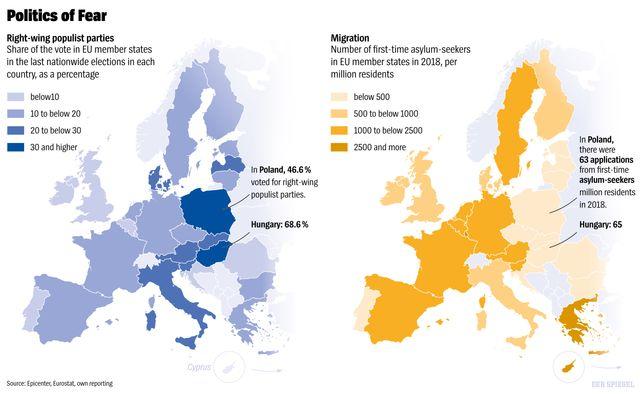Populist right-wing parties are surging to the forefront of political contests in Europe’s largest economies, according to recent polls that signal a significant shift in the continent’s electoral landscape. As these parties gain increased support, traditional mainstream parties face mounting challenges amid growing public concerns over immigration, economic uncertainty, and national sovereignty. This development marks a critical moment ahead of upcoming elections, raising questions about the future direction of European policy and integration.
Populist Right-Wing Surge Redefines Political Landscape in Germany and France
Recent electoral surveys indicate a significant shift in voter sentiment across Germany and France, two of Europe’s largest economies. Populist right-wing parties have gained unprecedented traction, appealing to a broad spectrum of the electorate by tapping into concerns over immigration, economic stagnation, and national identity. In Germany, the Alternative for Germany (AfD) continues to capitalize on disenchantment with traditional parties, particularly in the eastern regions. Meanwhile, France’s National Rally, under Marine Le Pen, has broadened its base, making substantial inroads into suburban and rural voters who feel neglected by centrist policies.
This political realignment poses new challenges for the established order, intensifying debates on sovereignty, EU integration, and social cohesion. Key factors driving these trends include:
- Economic insecurity: Rising unemployment and unequal recovery post-pandemic.
- Immigration policies: Calls for stricter border control and cultural preservation.
- Trust deficit: Growing skepticism toward mainstream political elites.
| Country | Leading Right-Wing Party | Current Poll Share (%) |
|---|---|---|
| Germany | Alternative for Germany (AfD) | 24 |
| France | National Rally | 27 |
Economic Discontent Drives Voter Shift Toward Nationalist Agendas
Across major EU economies, disillusionment with traditional economic management has significantly fueled voter migration toward parties that promise robust nationalist reforms. Inflationary pressures, soaring energy costs, and widening income inequalities have created fertile ground for populist rhetoric emphasizing sovereignty, strict immigration controls, and economic protectionism. Surveys indicate that in countries like Germany, France, and Italy, over 60% of voters cite dissatisfaction with economic policy as a primary reason for shifting allegiance to right-wing nationalist parties.
Political analysts point to a correlation between economic anxiety and the surge of nationalist platforms, which often advocate for:
- Increased state intervention in key industries
- Strengthened border controls
- Reduction of multinational corporate influence
- Prioritization of domestic labor markets
| Country | Econ. Growth 2023 (%) | Support for Nationalist Parties (%) | Unemployment Rate (%) |
|---|---|---|---|
| Germany | 1.2 | 38 | 5.5 |
| France | 1.0 | 42 | 7.1 |
| Italy | 0.8 | 45 | 9.0 |
Experts Urge Policy Reforms to Address Underlying Social and Economic Grievances
Analysts and social scientists emphasize that the surge in populist right-wing support across Europe’s largest economies is deeply rooted in longstanding social and economic discontent. They warn that without comprehensive policy interventions addressing inequalities, unemployment, and social exclusion, the current political landscape is likely to remain volatile. Key areas highlighted include affordable housing, equitable access to quality education, and robust social safety nets, all seen as critical to restoring public trust.
Experts suggest a multi-pronged approach to alleviate the underlying frustrations driving voter behavior. Among the proposed measures are:
- Implementing targeted job creation programs in marginalized regions
- Reforming tax codes to reduce wealth disparities
- Enhancing community engagement initiatives to rebuild civic participation
- Investing in lifelong skills training to adapt to evolving labor markets
| Policy Area | Current Challenge | Recommended Reform |
|---|---|---|
| Employment | High youth unemployment | Subsidized apprenticeships & training |
| Housing | Rising rent costs | Increased affordable housing projects |
| Social Welfare | Inadequate support for vulnerable groups | Expanded benefit coverage & outreach |
In Retrospect
As the political landscape in Europe’s largest economies continues to evolve, the rise of populist right-wing parties signals a significant shift with potential implications for both domestic policies and international relations. Observers will be closely watching how these trends influence upcoming elections and the broader direction of European governance in the months ahead.




